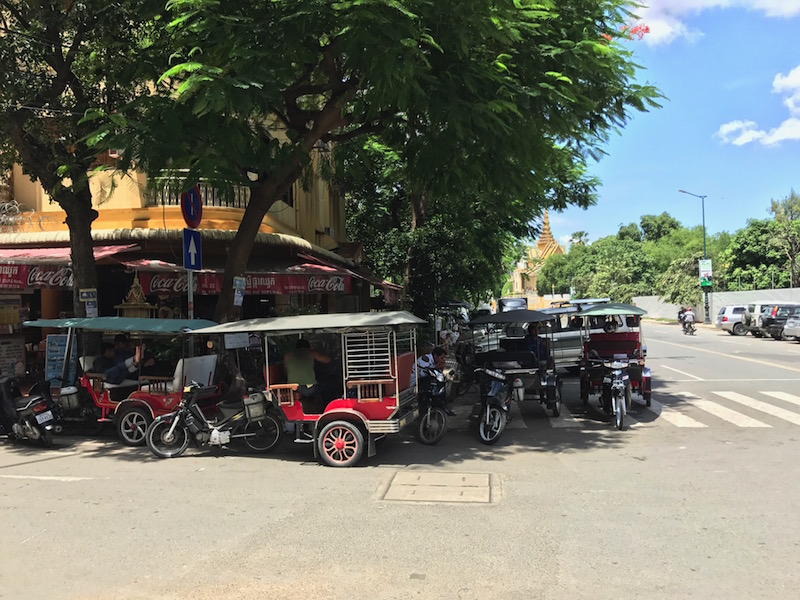Sim Dom has been plying his trade as a driver on the streets of Phnom Penh for more than 12 years, first with a motorbike and now with a tuk-tuk. Business used to be good but these days, the fruits of his labor are not so bountiful as before.
“Life is getting more and more difficult doing this business. Sometimes, like these two days, I have not even had one customer,” he said, sitting inside his tuk-tuk stationed at the corner of Wat Ounalom on Sothearos Boulevard.

His change in fortunes comes amid a shifting marketplace.
Recent years have seen more drivers competing for customers and the arrival of more metered tuk-tuks, while the rise of smartphone applications enables customers to virtually “hail” private cars.
It could mean hard times ahead for humble tuk-tuk drivers like Mr. Dom. His two children are both in kindergarten, his wife earns between $2.50 and $5 per day selling vegetables at the market, and they live in his mother’s house.
The 38-year-old driver has incurred an $800 debt from his current tuk-tuk. He has repaid half the sum so far.
He’s not the only tuk-tuk driver in the capital to feel the pinch.
Chin Yong, 48, who began driving in 2004, possesses a basic command of English that offers him an advantage, but his situation has followed suit with that of Mr. Dom.
“In the past at the peak time I used to be able to make almost $25 a day, but now especially these past few years I can barely make more than $10,” he said, waiting for his customer inside his tuk-tuk at the corner of Sothearos Boulevard and Street 178.
Mr. Yong points toward the current oversupply of tuk-tuks and the advancement of metered tuk-tuks to explain the change.
Vorn Pao, the president of the Independent Democracy of Informal Economy Association (IDEA), the largest tuk-tuk association in the country comprising about 10,000 members, voiced his concerns about the growth of metered tuk-tuks and the ability of drivers to continue earning a living if the situation was not addressed.
“It’s getting harder for tuk-tuk drivers to compete in this market,” he said.
Mr. Pao added that the metered tuk-tuks entering the Cambodian market from India use compressed natural gas instead of gasoline, which leads to lower costs. In the long run, he suggested the adoption of a standard metered system for all tuk-tuks.
Dulach Hor, the founder of EXNET Taxi, a local car-hailing app with about 700 daily passengers in Phnom Penh and nearly 800 registered drivers, said passengers were changing, and some were using the new technology, which could affect traditional tuk-tuks.
“Right now it does affect their business but we have plans in the future to invite them and open the tuk-tuk services so we can pass the job to them,” he said.
“It is like in the beginning with the cyclo, but the tuk-tuk came and affected the cyclo,” Mr. Hor added.
Ear Chariya, director of the Institute for Road Safety, agreed that times are changing and the emergence of mobile hailing apps would—in the long run—have a “big impact.”
Mr. Chariya emphasized that sooner or later, traditional tuk-tuks would need to implement new technology of some form.
“I think the traditional tuk-tuk [drivers] who do not have that kind of applications or do not use the meter will have a disadvantage to compete with the modern tuk-tuks that use applications and meters,” he said.
Mr. Chariya also encouraged large global companies entering the Cambodian market, such as Uber, to help traditional tuk-tuks in learning and catching up with hailing apps.
Some residents and visitors, however, appear to be backing the old ways.
Rod Monroe, a retired American who has lived between the U.S. and Cambodia for the past two years, deems smartphone ride-hailing apps unnecessary and unfavorable in today’s saturated tuk-tuk market, despite his usage of Uber in the U.S.
“Too many guys need to work and they have families and stuff, any more to take away from them is going to be a negative,” he said.
Mr. Monroe, 60, also enjoys the personal touch, citing his enduring friendship with drivers since his arrival in Phnom Penh.
He added that he would “never” switch to vehicle-hailing applications in the future.
Daniel Rosenberg, 19, a German tourist visiting Cambodia for the last week, is another fan of the traditional method, saying he prefers the open-air sightseeing experience in a tuk-tuk compared to cars.
Asked if he would consider switching to hailing applications for the remainder of his two-week stay, Mr. Rosenberg responded: “Unless there were no tuk-tuks in the entire city, I do not see why I would need to.”
Without change, the future of traditional tuk-tuks could climb back up or continue a descending trajectory.
For now, at least, the dilemma between raising one’s hand on the street or clicking the “confirm booking” button remains uncertain.



